Retrospective Hero
Retrospective Hero is a new simulation / role playing workshop I’m developing with Nicole Belilos of Task24. The goal is to let facilitators experience several situations that can happen in real life, and let them experiment with facilitation techniques to make the most of a situation. This is a report of the trial run we held at Agile Open Holland 2009, with an explanation on how the workshop works.
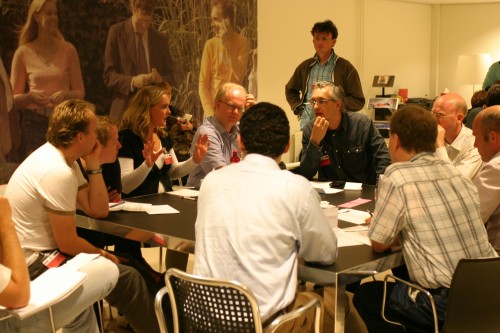
Sandra, one of the product owners, explains her point of view, Serge listens intently as facilitator
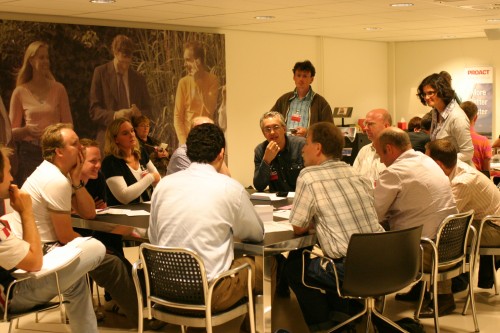
Now, lets' hear the second group of product owners, with their position
Nicole and I thought it would be fun do design a simulation game around facilitating retrospectives. At first we came up with a sort of board game, but after some brainstorming we thought a role-play would work better – our board game was turning out to be a bit too simplistic for our taste.
These are the benefits we proposed for our session at XP Days Benelux 2009, November 23/24:
- Learn new techniques by applying them to a simulated real world situation
- Experiment with techniques you already know – do something different with them
- Hold an emergency retrospective to ‘get to the bottom of it’ and come up with sustainable solutions quickly.
- Get some fresh ideas to do group reflection on emergency situations and longer timespans
At XP Days we have an hour and 45 minutes, for the try out at Agile Open we decided to see what we could do in a 60 minute timeslot to get as much feedback as possible on our game ideas. For the XP days version we were thinking about playing two simulation rounds, in which the participants get to deal with a) facilitating during an emergency situation and b) facilitating a retrospective over a longer period (weeks or months).
We were most curious about facilitating in an emergency; what we expect to learn from these simulations as hosts is observing facilitators ‘in the wild’ under controlled conditions and seeing how they behave, and what techniques work in which circumstances ![]() (we have our preferences, but they do not necessarily end up in the simulation). For the longer-term retrospective part we still would like to do a trial run. Contact me if you’re interested in hosting it.
(we have our preferences, but they do not necessarily end up in the simulation). For the longer-term retrospective part we still would like to do a trial run. Contact me if you’re interested in hosting it.
Therefore we designed a role play that happens in a Bank, something went terribly wrong and after the facilitator comes in on a monday morning he or she is asked to facilitate a ‘hero retrospective’ : find out what went wrong quickly and get the group to agree on some actions.One or two participants play facilitator, while the other participants play roles like product owners, helpdesk boss, development team and systems administrators. We give everybody an overview of the situation, and then each role receives an envelope with a more detailed description of what happened from their point of view. This leads to a group situation where everybody has partial information, so one of the challenges for the facilitator is to surface all the relevant information quickly. (I won’t say much more, because I fear that would spoil the simulation in case you come and play it…)
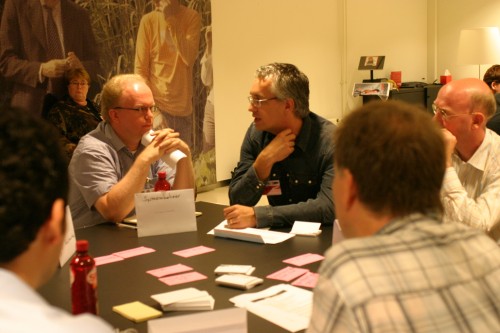
The systems administrator speaks. The index cards in front represent the partial outcome of A3 problem solving. In the background, Mary Beijleveld observes what Nicole and I are doing, so that we could get feedback on our own behaviour - lots of facilitation going on ![]()
We creatively brainstormed the situation and roles based on our own experiences. And it worked. One of the players asked me ‘does this happen?’ about something that I experienced during a meeting; some of the assignments and poses of the roles seem far-fetched, but things get political when people have to divide resources, and as a facilitator you’d best be prepared to not be surprised about that ![]()
You might say ‘that is not a retrospective’, and you may be right; that is something that we want the participants to figure out and discuss in the debrief. And at agile open they did. Participants found that for effective facilitation you need to find a technique and style that fits you, the participants and the context. Some ‘participants’ preferred a ‘businesslike’ style, focused on only content, while others seemed to prefer also getting the mood of the people on the table.
In writing this sounds like knocking down an open door, but the emergency role play was pretty intense, with at least one facilitator behaving differently from his own expectations. We really did manage to create a stress situation ![]() .
.
Now we have to pick up the pieces and figure out what to do next with the simulations and the workshop. The participants gave us a good amount of useful feedback. The roleplay worked well, so we are going to keep that, but how to fit it into an overal workshop seems to, ehh, depend ![]() . We introduced two techniques before the simulation, and encouraged the facilitators to use one of those two. Next time we may only chose one, and see how that compares between groups, or alternatively (especially in an in-house course where we have more time), start out without a specific suggestion, roleplay and learn from the debrief, maybe explain a technique and try again, and see what difference that makes.
. We introduced two techniques before the simulation, and encouraged the facilitators to use one of those two. Next time we may only chose one, and see how that compares between groups, or alternatively (especially in an in-house course where we have more time), start out without a specific suggestion, roleplay and learn from the debrief, maybe explain a technique and try again, and see what difference that makes.
In reviewing the session for XP Days, Pierluigi Pugliese suggested we add observers to the list of roles, and give them specific instructions. That seemed to work well.
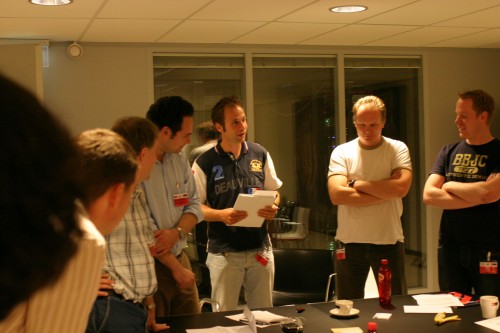
Jorrit shares his observations with the group
Since we are operating a kind of pull system for workshops, we asked ourselves beforhand: what do we want to learn from the try-out (does the simulation work? This is the first roleplay I helped create.), and what is the least amount of work we need to do to get that feedback. Therefore we created all the role descriptions in dutch…
Deborah Preuss wanted to participate, and while she speaks and understands a couple of languages, dutch is not among them. So we improvised and gave her, as an observer, the task to observe and interpret body language. Because of this the players learned about the effect of finger pointing, and that they were doing it without realizing it… The debrief was interesting. Deb noted that at some point several players’ body language indicated they knew enough and were finished with the discussion.
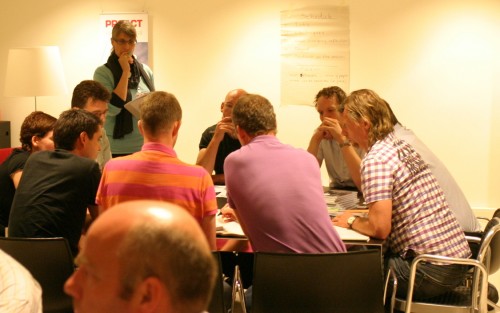
Deborah observes body language of one group
From the players’ perspective that was partially true: some of the players were finished with the discussion, not because they were satisfied, but because they realized they had nothing to gain by the meeting, as their concerns went unheard (and unacted upon).
For those of you who asked me what Retrospective Hero was, and what it was about, I hope this cleared it up a bit. I welcome your questions and suggestions. For those of you who participated or observed, we’d love to know what you feel about the game after a few weeks.
In any case, we hope you join us at XP Days Benelux 2009 to experience the extended version ![]()
